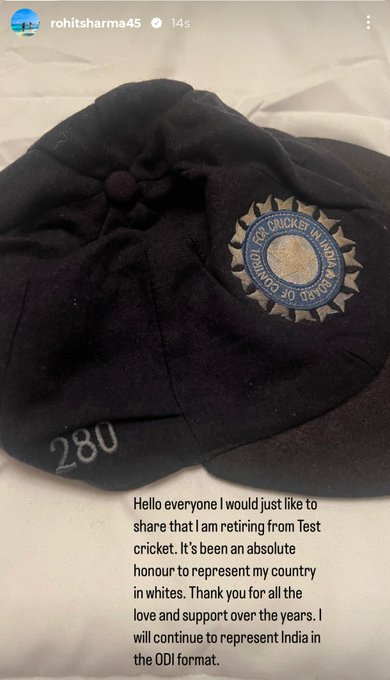By The Sampadak Express
In a major development, Rohit Sharma has announced his retirement from Test cricket with immediate effect. The decision comes ahead of India’s crucial five match Test series against England, set to begin on June 20, marking the start of the new ICC World Test Championship (WTC) cycle.
According to information, the BCCI selection committee, headed by Ajit Agarkar, has decided to move on from the 38-year-old as Test captain. The change is reportedly performance-based rather than part of a broader transition strategy. While there is no official word yet on whether Rohit will be included in the squad as a player, the report suggests he will continue to be a key part of India’s ODI plans.

Concerns over Rohit’s recent Test form, especially in overseas conditions, played a crucial role in the selectors’ decision. During the last tour of Australia, he managed only 31 runs in six innings and opted out of the final Test. His overall Test average stands at 40.57, but it drops significantly to 31.01 outside India. In contrast, he has performed well in England, averaging 44.66 in Tests there almost identical to his average as an opener in the country (44.54).
India’s failure to qualify for the WTC final for the first time in the 2023-25 cycle has also put additional pressure on the leadership group. The team suffered a rare whitewash at home against New Zealand and lost 3-1 in the Border Gavaskar Trophy, ultimately missing out on a third consecutive WTC final appearance. South Africa and Australia are set to contest the final next month.
Rohit, who took over the Test captaincy in 2022 following Virat Kohli’s resignation, led India in 24 matches, securing 12 wins, nine losses, and three draws.The BCCI has yet to name a successor. While pace spearhead Jasprit Bumrah has been vice-captain, recurring fitness concerns may rule him out of contention. Young batter Shubman Gill, who has led in ODIs, is another potential candidate.
With Rohit remaining India’s ODI captain and Suryakumar Yadav leading in T20Is, India will now have different captains across all three formats a significant shift in their leadership structure.



